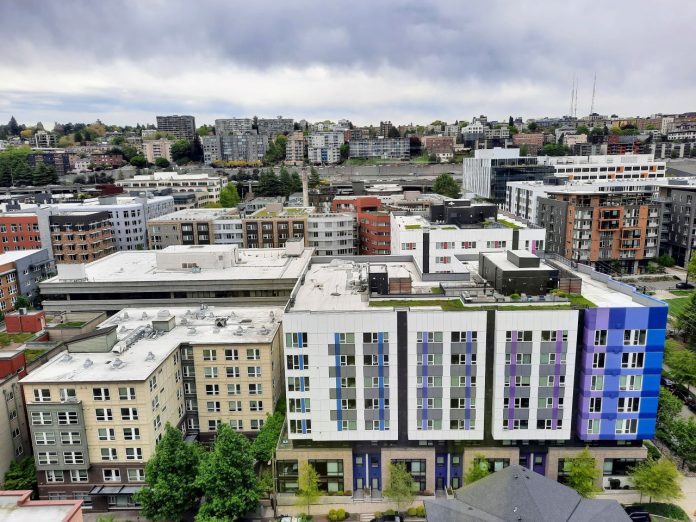
President Biden has called out junk fees, but landlords continue to charge them in most jurisdictions, Seattle included.
“Junk fees” are a growing problem across the economy, as corporations nickel and dime consumers with arbitrary and surprise costs added to the prices of concert tickets, hotel stays, and more. Here in Seattle we’ve received a pointed lesson in the subject this year, as delivery app company DoorDash has tried to strongarm elected leaders into rolling back minimum pay standards for gig workers by slapping on fees.
Junk fees are understandably unpopular (“they’re trying to charge me what???”) and the current presidential administration has taken note. Biden announced an offensive against “junk fees” in his State of the Union address last year.
Soon after, the U.S. Department of Housing and Urban Development (HUD) sounded the alarm about junk fees in the rental housing sector, noting that “many renters today face fees that are hidden, duplicative, or unnecessary as part of the housing search and leasing process.” HUD called on “state and local governments to adopt policies that promote fairness and transparency of fees faced by renters.”
Our city council should answer HUD’s call. Seattle-area renters have been complaining about rental junk fees for some time, as I wrote about early last year.
The Stay Housed Stay Healthy coalition, which I help to coordinate through my work with the Transit Riders Union, compiled a list of common rental junk fees. These include but are not limited to:
- Application fees that exceed the actual costs of tenant screening;
- Fees for signing or renewing a lease;
- “Admin” fees for god knows what;
- Fees for required “valet” garbage service;
- Monthly rental fees for in-unit washers and dryers, and
- Fees for mandatory apartment inspections.
In April 2023, the (former) Seattle City Council took a small first step toward addressing rental junk fees by banning so-called “notice delivery fees.” Often $50 or $75 a pop, many landlords slap on this charge whenever they tape a notice, such as a late fee notice or a notice to comply with lease terms, to a tenant’s door. Seattle’s prohibition was part of an ordinance limiting late fees to $10 a month; without it, landlords could simply jack up notice delivery fees to effectively skirt the new cap.
The City of Shoreline has already gone a little further than Seattle in clamping down on this nonsense. Last December, as part of a package of renter protections, the city not only banned notice delivery fees but also stipulated that a landlord may not charge a fee for a tenant’s access to common areas, or a prorated share of utilities for such areas, or a fee for the performance of any landlord duty required by the Residential Landlord-Tenant Act.
A law like this would help tenants at the Greenhouse Apartments in Seattle’s Columbia City neighborhood. Their leases list a monthly utility fee mysteriously labeled “Porter.” The tenants I spoke with weren’t entirely sure what this meant, but they thought it might refer to cleaning and maintaining the building’s common spaces.
Several recent bills (e.g. HB 2114) in the Washington State Legislature, had they passed, would have banned another common practice, that of charging exorbitant monthly fees — often hundreds of dollars — on top of the monthly base rent for entering into a month-to-month lease agreement instead of a longer term lease. That idea may get another try next year.
But the most comprehensive proposal to date comes from Bellingham Councilmember Jace Cotton. Before he was elected to the council in 2023, Cotton was an organizer with Community First Whatcom, which ran successful initiatives to raise the minimum wage and to mandate landlord-paid relocation assistance in cases of large rent increases.
Last summer, in a focus group of about 30 tenants, Cotton says he heard story after story about rental junk fees. “It became really clear that this is a pervasive and growing problem,” he says.
Cotton deepened this understanding by talking with renters at their doors and meeting with a variety of stakeholders, and gradually assembled a draft ordinance that he expects to formally introduce this fall. The ordinance prohibits landlords from charging tenants “unfair or excessive fees,” and then goes on to enumerate a lengthy list of such fees, including but not limited to all the ones mentioned above.
What are the prospects for this ambitious proposal? Cotton, who is the only renter on council, says that his colleagues have often been surprised to hear tenants’ stories of ridiculous fees.
“There’s almost a visceral reaction of, ’Why on earth are you charging tenants $50 a month to use the washer-dryer?,’” Cotton says. Though he says it’s too early to predict what amendments might be made to the ordinance, he’s hopeful of strong council support for final passage.
Bellingham isn’t the only jurisdiction in the country that may be considering action. Earlier this year, the Housing Policy Clinic at the University of Texas at Austin released a report on rental junk fees and recommended both state and city-level regulations; Austin’s Housing Department is reportedly working on the issue. And Takoma Park, Maryland, which also has local rent stabilization laws, has had relatively comprehensive laws regulating rental fees on the books for years.
Junk fees in all areas of the economy are having a political moment. If our Seattle City Councilmembers want to endear themselves to the growing majority of their constituents who happen to be renters (they don’t, I know, but humor me here!), they should follow Bellingham’s example and crack down on rental junk fees.
This piece is part of Katie Wilson’s ongoing Policy Lab series. Check out the introduction and earlier installments, which have covered mode shift incentives, taxing the rich, paid vacation, and more.
Katie Wilson is General Secretary of the Transit Riders Union, a Seattle-based organization advocating for improving transit quality and making access more equitable. In 2025, she launched a run for Seattle Mayor.

